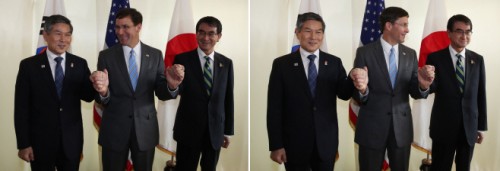 |
| The alliance between South Korea and the United States is facing challenges. While the two countries are in a fierce confrontation over the extension of General Security of Military Information Agreement (GSOMIA) that expires on Nov. 23, the US walked out of defense cost-sharing negotiations with South Korea in Seoul and it has not denied the possibility of reducing US forces based in South Korea. The photo shows US Defense Secretary Mark Esper (center) holds hand with his counterparts Defense Minister Jeong Kyeong-doo (left) and Japan’s Defense Minister Taro Kono prior to a trilateral meeting Sunday at the Avani Plus Riverside Hotel in Bangkok, Thailand./ Source: Yonhap News |
By Washington correspondent Ha Man-joo
The alliance between South Korea and the United States is facing challenges.
While the two countries are in a fierce confrontation over the extension of General Security of Military Information Agreement (GSOMIA) that expires on Nov. 23, the US walked out of defense cost-sharing negotiations with South Korea in Seoul and it has not denied the possibility of reducing US forces based in South Korea.
During a briefing with reporters in Manila, the Philippines, US Defense Secretary Mark Esper refused to speculate when asked Tuesday whether the US would consider reducing troops in the South. “I’m not going to prognosticate or speculate on what we may or may not do,” Esper said. It is clearly intended to seek a significant increase of Seoul’s defense cost-sharing payment by making an issue of US force reduction in South Korea. This is because his remark comes a few hours after US negotiators left the negotiation table for talks in Seoul with South Korean delegation for the third round of the 11th Special Measures Agreement (SMA), the two sides’ defense cost-sharing accord. Shortly after the meeting, James DeHart of the US State Department, who led the US delegation, held an unusual press conference with reporters and demanded the South Korean side put forward a “new proposal.”
However, it is unusual for the US defense chief not to make a clear position on the question on reducing the US troop presence in South Korea, which has served as the center of the ROK-US alliance and the linchpin of security in the Northeast Asian region.
Changes of US stance in reducing US soldiers in the South were detected in the comments made by US Joint Chiefs of Staff Chairman Gen. Mark Milley on Nov. 11. On his way to Japan, Milley told reporters that “the average American looking at the forward deployed US troops in South Korea and Japan ask some fundamental questions: Why are they needed there? How much does it cost? These are very rich and wealthy countries, why can’t they defend themselves?” His remarks are an attempt to leverage more pressure on Seoul to increase its contribution to the cost of stationing US troops in South Korea by raising questions about the nature of US military presence in the country.
Above all, there are concerns about US President Donald Trump’s confidence in the US-ROK alliance. Since becoming a presidential nominee in 2016, Trump stressed ‘neo-isolationism’, saying it was time for the United States to quit serving as the world’s policeman and take care of business at home. Last July, the US Congress passed the amendment to the 2020 National Defense Authorization Act (NDAA), which includes prohibits reduction of US forces in South Korea below 28,500. It reflects Trump’s view of alliance that prioritizes money over values.
As the Trump administration did not deny the possibility of reducing the US troop presence in Korea, there is a concern that this could spread not only to the security sector, but also the economic sector. In this case, not only the ROK-US alliance but also the whole relations will be put to the test.
#South Korea-US alliance #Mark Esper #GSOMIA #NDAA #SMA
Copyright by Asiatoday
Most Read
-
1
-
2
-
3
-
4
-
5
-
6
-
7





















